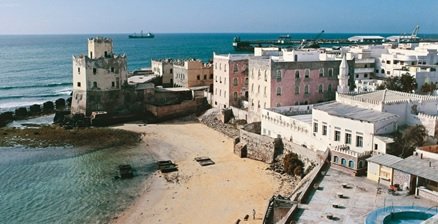By Liban Ahmad
Calls to grant Mogadishu a Federal Member State Status under the “no representation, no taxation” theme, show that federalism project of Somalia has entered a new stage. Political elites in favour of a federal member state status argue that Mogadishu is being judged by unfairly as capital city although it has in common with other Somali cities the character of “clan ownership”. To assess merits and demerits of this argument one must understand how Mogadishu has transformed from a cosmopolitan capital city to a city claimed by a social group.

After the ouster of the military dictatorship in 1991 the United Somali Congress leadership divided Mogadishu into zones (aagag) run by militias of respective sub-clans. The USC Central Committee was not able to reconcile conflicting policy decisions: the decision to disband Somali Armed Forces to rely on undisciplined and poorly trained USC militias to control Mogadishu and nearby regions.
The division of Mogadishu into militia zones foreshadowed what Mogadishu had undergone when USC split into two factions and fought over the control of Mogadishu. The war divided the capital city into North and South districts and exacerbated the wave dispossessions that affected many people who fled the capital city in 1991. The disregard for property rights under USC-installed interim government turned out to become a symptom of state collapse. The second wave of dispossession severely affected people presumed to be supporters of the two USC factions led by Ali Mahdi Mohamed and General Mohamed Farah Aideed.
In a speech at Puntland Development Research Center Faisal Roble discussed what dispossession means for Puntland — a Federal Member State formed by internally displaced peoples (IDPs), who fled Mogadishu in 1991. Roble said that people had lost wealth they generated for centuries, and that this problem required redress. While the problem of dispossession emphasised by Roble is factually documented, the suggested redress leaves out other Somali citizens whom militias had dispossessed. The historic dispossession issue is inseparable from property rights. Since we are still grappling with the effects of state collapse and civil war, it will not sound absurd if IDPs and their offspring in Puntland believe they will not have their property rights protected in Mogadishu. The capital city has lost its cosmopolitan feel.
A visit to Shingani, Hamarweyne, Abdiaziz, Hamar-jajab and Waaberi districts will leave one in no doubt that Mogadishu has been reduced to a provincial capital. During 1990s militias used clan identity to dispossess their fellow citizens.
Why should people use the same clan identity to claim “ownership” of a capital city now?
If all other capital cities of federal member states remain a clan’s fiefdom, one can draw the conclusion that Mogadishu is being judged unfairly. If you accept this argument you will be questioning the foundation upon which the Somali citizenship is based.
The debate on property rights and the quest for federal state status for Mogadishu does not take into account rights, interests and grievances of Somalis wrongly classified as political minorities, who suffered disproportionately during the civil war and still continue to be politically marginalised. No city of Mogadishu’s size in Somalia has ever benefited from cross-clan investment. The choice of Mogadishu as a capital city influences decisions of business people, who hail from other regions, to invest in real estate, construct factories and launch other businesses in Mogadishu.
There will always be a Somali social group outnumbering other people in any other city selected as the seat of the Federal Government. This numerical strength translates into influence to be able to mobilise people against the government, the same problem Mogadishu is facing. Trade-off is the appropriate strategy to solve this governance problem. The dominant social group in a capital city will retain the geographic advantage to benefit from being associated with the capital city but will have their political powers drastically reduced in the interest of citizenship identity.
Demographic changes caused by the civil war are irreversible in Mogadishu. What any effective government can reverse are illegal changes such as buildings on unplanned parts of the city, occupation of government buildings, and government properties illegally sold to politicians for political reasons. Those measures can be simultaneously introduced in other parts of the country where similar problems exist.
If citizens see justice is being done, confidence in Somali Federal Government will grow; collective trauma of the civil war will begin to have a lesser impact on our political judgment. The discussion on whether Mogadishu should have a federal member state status may be pushing us towards that direction.
Liban Ahmad
Email:[email protected]
We welcome the submission of all articles for possible publication on WardheerNews.com. WardheerNews will only consider articles sent exclusively. Please email your article today . Opinions expressed in this article are those of the author and do not necessarily reflect the views of WardheerNews.
WardheerNew’s tolerance platform is engaging with diversity of opinion, political ideology and self-expression. Tolerance is a necessary ingredient for creativity and civility.Tolerance fuels tenacity and audacity.
WardheerNews waxay tixgelin gaara siinaysaa maqaaladaha sida gaarka ah loogu soo diro ee aan lagu daabicin goobo kale. Maqaalkani wuxuu ka turjumayaa aragtida Qoraaga loomana fasiran karo tan WardheerNews.
Copyright © 2024 WardheerNews, All rights reserved


